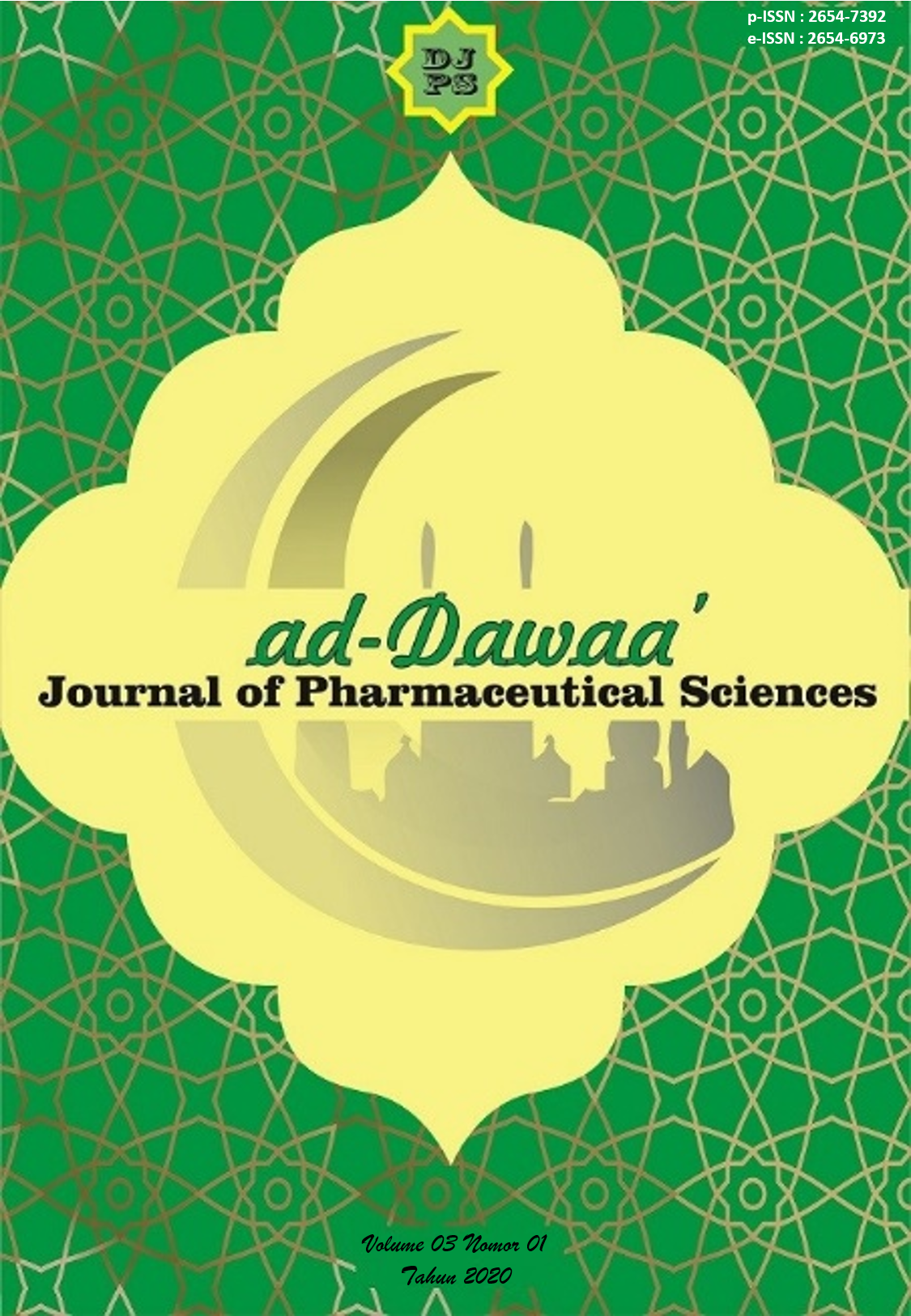Activity of Bidens Pilosa Herb Infussion as Antiinflammatory
Abstract
Ajeran (Bidens pilosa), traditionally, was widely used to reduce pain and inflammation. This study aims to determine the activity of Ajeran herb infusion as an anti-inflammatory. Determination of activity using 18 mice which were divided into 6 groups. Blank group (I) was given aquadest, groups II, III, IV and V were given Ajeran dry herb infusion with concentrations 10, 20, 30 and 40% w/v, respectively, and group VI was given sodium diclofenac suspension 0,195 mg/ml, each 1 ml. Inflammation induction was performed by administering eggwhite suspension 1% v/v on the sole of the left foot. Foot volume before and after induction were measured as normal and initial edema volume. After that, the mice were given treatment and measurements of foot volume again at 15, 30, 45 and 60 minutes. The test results showed that the infusion of Ajeran and diclofenac sodium could reduce edema starting at 15 minutes, which were 17.8% (II); 20.6% (III); 22.2% (IV); 25% (V); and 15% (VI). It was different with blank group, the volume of edema did not decrease (0%). At 60 minutes, the volume of edema in all groups higher decreased that at 15 minutes, namely 23.4% (I); 28.9 (II); 35.6 (III); 37% (IV); 41.7% (V); and 30% (VI). The conclusion is that the administration of Ajeran infusion can reduce the volume of edema of feet with inflammation of mice.Downloads
References
Anosike, C. A., Obidoa, O., & Sezeanyika, L. U. (2012). The anti—inflammatory activity of garden egg (Solanum aethiopicum) on egg albumin—induced oedema and granuloma tissue formation in rats. Asian Pacific Journal of Tropical Medicine, 5(1), 62-66.
Bairwa, K., Kumar, R., Sharma, R. J., & Roy, R. K. (2010). An updated review on Bidens Pilosa L. Der Pharma Chemica, 2(3), 325-337.
Borges, C., Matos, T. F., Moreira, J., Rossato, A., Zanette, V. C., & Amaral, P. A. (2013). Bidens pilosa L. (Asteraceae): traditional use in a community of southern Brazil. Revista Brasileira de Plantas Medicinais, 15(1).
Choy, K. W., Murugan, D., Leong, X.-F., Abas, R., Alias, A., & Mustafa, M. R. (2019). Flavonoids as Natural Anti-Inflammatory Agents Targeting Nuclear Factor-Kappa B (NFκB) Signaling in Cardiovascular Diseases: A Mini Review. Frontiers in Pharmacology, 10.
Ferrero-Miliani, L., Nielsen, O. H., Andersen, P. S., & Girardin, S. (2007). Chronic inflammation: importance of NOD2 and NALP3 in interleukin-1β generation. Clinical and Experimental Immunology, 147(2), 227–235.
Fotso, A. F., Longo, F., Djomeni, P. D., Kouam, S. F., Spiteller, M., Dongmo, A. B., & Savineau, J. P. (2014). Analgesic and antiinflammatory activities of the ethyl acetate fraction of Bidens pilosa (Asteraceae). Inflammopharmacology, 22(2), 105-114.
Njume, C., Gqaza, B. M., Rozani, C., & Goduka, N. I. (2016). Studies on bioactivity and secondary metabolites of crude extracts of Bidens pilosa L. (Asteraceae): A medicinal plant used in the Transkei region of South Africa. Pakistan Journal of Pharmaceutical Sciences, 29(3), 877-885.
Ricciotti, E., & FitzGerald, G. A. (2011). Prostaglandins and Inflammation. Arteriosclerosis, Thrombosis, and Vascular Biology, 31, 986–1000.
Yi, J., Wu, J.-G., Wu, Y.-B., & Peng, W. (2016). Antioxidant and Anti-proliferative Activities of Flavonoids from Bidens pilosa L var radiata Sch Bip. Tropical Journal of Pharmaceutical Research, 15(2).
Once an article was published in the journal, the author(s) are:
- granted to the journal right licensed under Creative Commons License Attribution that allows others to share the work with an acknowledgement of the work's authorship.
- permitted to publish their work online in third parties as it can lead to wider dissemination of the work.
- continue to be the copyright owner and allow the journal to publish the article with the CC BY-SA license
- receiving a DOI (Digital Object Identifier) of the work.


1.png)